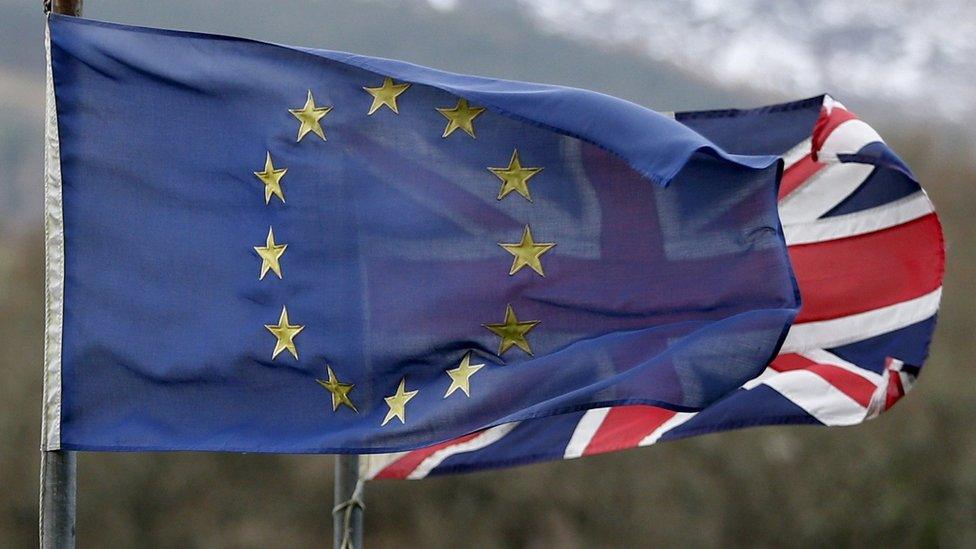Is Scotland the most pro-EU part of the UK?
- Published

Polls suggest Scotland is more likely than other parts of the UK to vote to remain in the European Union. Why?
"Euroscepticism exists in Scotland - of course it does - but, in my view, not to a great extent, and not with the same virulence as we sometimes see in some other parts of the UK."
Those were the words of Scotland's First Minister Nicola Sturgeon, when she spoke to an audience in Brussels last year about why she believes "unequivocally that membership of Europe is in Scotland's best interests".
The leaders of the other parties represented in the Scottish Parliament - Labour, the Conservatives, the Liberal Democrats and the Greens - have all said they will campaign to stay in.
Just UKIP and a few individual campaigners have said they will join the side in favour of 'Brexit'.
And evidence suggests support for Europe goes beyond the political bubble.
'Firmly remain'
Prof John Curtice, the polling expert, says polls indicate Scotland is "firmly" in the remain camp.
He says: "There is no doubt: Scotland is markedly more pro-European, markedly more likely to say it's going to vote to remain, than is the UK as a whole.
"Typically it's of the order of 12, 13, 14 points or so more likely to say they are going to vote to remain."
It has looked increasingly more pro-EU since devolution, Prof Curtice says.
Much of that, he argues, is down to Scotland's relationship with the SNP.
Polls suggest Conservatives in Scotland are divided, like many of their counterparts in other parts of the UK.
Labour's position in Scotland largely mirrors the mostly pro-EU position of party members south of the border.
"What distinguishes Scotland is half the population at the moment supports the SNP and the SNP, for the most part, convinced a clear majority, though not all of their supporters, to believe in Europe," Prof Curtice says.
'Less bossy'
Scottish nationalist leaders see an independent Scotland being part of the EU and that is "essential and central" to explaining Scotland's apparent pro-EU stance, he adds.
But that doesn't mean Scottish opinion is uncritical.
"The truth is the modal Scottish voter probably says we need to be inside the European Union, but we wouldn't be unhappy if Brussels was to boss us around rather less," Prof Curtice says.
"To that extent at least, the mood in Scotland is not that different from many voters in England who would also agree with that sentiment."
We went to speak to some voters to see what they were enthusiastic about - if anything - when it came to the EU.
On Edinburgh's Princes Street, one mother told us she thought maternity rights were enhanced by EU membership.
EU membership prompted mixed views in Edinburgh's Princes Street
A man told us he thought being part of the bloc had been good for union rights.
Another told us he simply liked the idea of being in the European Union bloc.
Our unscientific survey in the Scottish capital found just one man who wanted to leave, blaming money spent on the project and human rights legislation.
Across the country Port Glasgow, on the Clyde, has seen challenges in recent years. Shipbuilding contracts have been lost to other European countries under tendering rules.
People in Port Glasgow wanted the benefits of EU membership to be clarified
Support for the EU on the Princes Street here was less spirited.
One man told us he was worried continued membership would lead to Scotland ending up in the same financial position as Greece.
Another suggested he had problems with people using the Scottish education system then leaving to work elsewhere.
Yet the majority still told us they wanted to remain. Arguments included that Scotland would be better independent, but within the EU.
It could be just a few months until we find out exactly what Scotland thinks. But the signs are that it wants to stay.